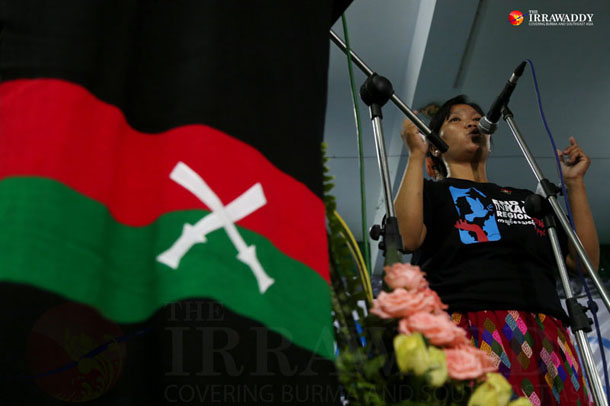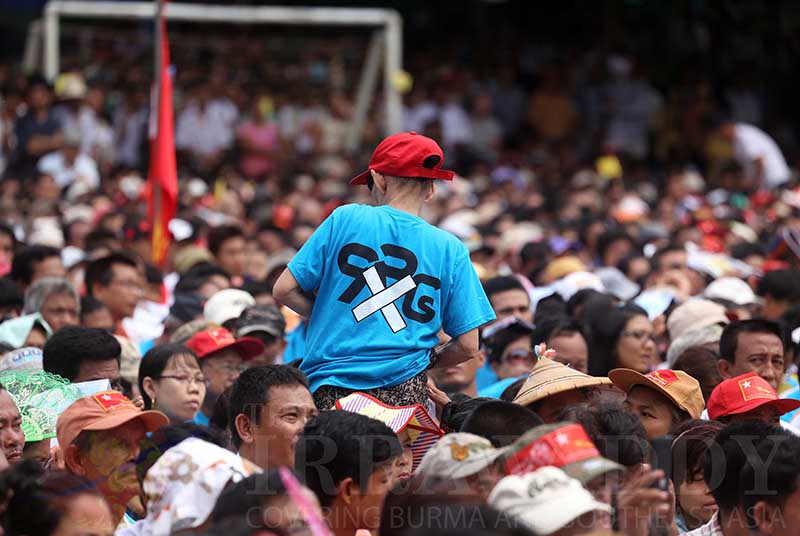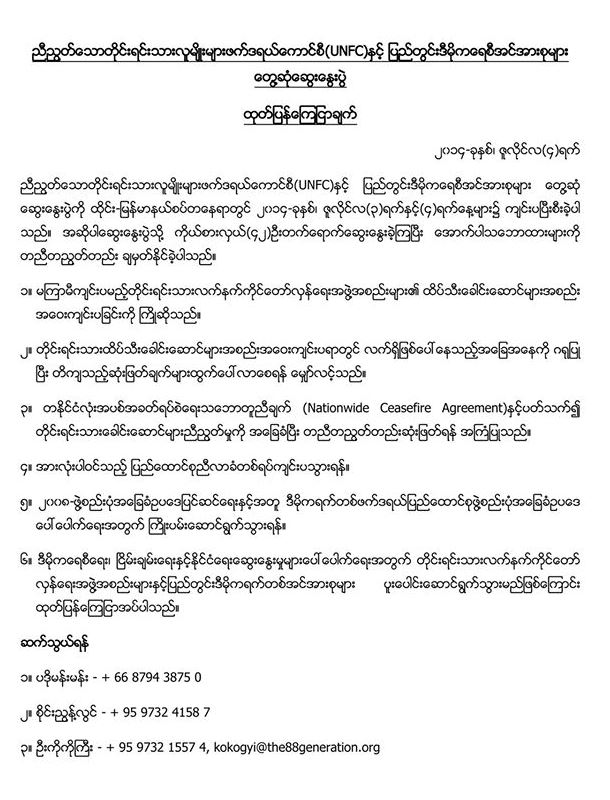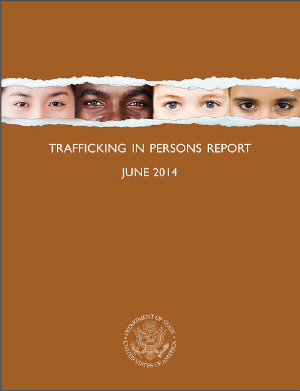Posts Tagged ‘2008 Constitution’ (102 found)
Statement on Anti Muslims Violence in Mandalay
Burmese Muslims Association strongly condemns anti-Muslim violence that has erupted in recent days in Mandalay, the second largest city in Burma. The violence that has occurred is not simply a result of sectarian conflicts. It is without doubt a well-planned operation, carried out by a group of well-trained thugs–which has tacit impunity and free license from the Thein Sein’s government–not only to cause a great deal of physical harm and injury against Muslims, a helpless minority group in Burma, but also to instil immense psychological terror and mental anguish, during the Muslim holy month of Ramadan […]
• • •Now is the Time to Act, Sexual Violence Must End in Burma
 On 10 June 2014, the Burma government prepared to sign the ‘Declaration of Commitment to End Sexual Violence in Conflict’ at the end of a three-day global summit, which aimed to “shatter the culture of impunity for sexual violence in conflict.” On the same day, a woman was brutally beaten by a Burma Army soldier during an attempted rape in Rezua, Chin State. The eyewitnesses who spoke to the Chin Human Rights Organization said that the women was held down by the soldier, while he repeatedly beat her. She was rushed to the hospital and is fortunately now in recovery.
On 10 June 2014, the Burma government prepared to sign the ‘Declaration of Commitment to End Sexual Violence in Conflict’ at the end of a three-day global summit, which aimed to “shatter the culture of impunity for sexual violence in conflict.” On the same day, a woman was brutally beaten by a Burma Army soldier during an attempted rape in Rezua, Chin State. The eyewitnesses who spoke to the Chin Human Rights Organization said that the women was held down by the soldier, while he repeatedly beat her. She was rushed to the hospital and is fortunately now in recovery.
However, this brutal event has lead to a series of demonstrations in Rezua and Matupi, Chin State this week, calling for an end to sexual violence. According to The Irrawaddy, protesters held placards that stated: “Stop raping; We are humans, not animals. We are humans, not property.” Though the organizers requested to hold the rally, the local police denied their applications and they have been arrested for staging a peaceful demonstration without permission, ironically under the Peaceful Assembly and Peaceful Procession Law.
This recent case of attempted rape is not a one-off incident of a rogue Burma Army soldier. A report produced by Women’s League of Burma (WLB) ‘Same Patterns, Same Impunity’ demonstrates how the sexual violence inflicted by the Burma Army soldiers are systematic in nature and a part of a wider structural system of politicizing women’s bodies and abusing them as instruments of war and oppression. The data collected by WLB and its members found that since the 2010 elections, over 100 cases of rape has been documented, of which 47 were brutal gang rapes and victims were as young as eight years old. Most of the documented cases were linked to Kachin and Northern Shan State where military offensives have been taking place since 2011, indicating that rape and sexual violence is in fact, used as a weapon in an attempt to demoralize the ethnic communities and to assert dominance over them […]
• • •Trafficking in Persons Report 2014
Burma is a source country for men, women, and children subjected to forced labor, and for women and children subjected to sex trafficking in other countries. Burmese men, women, and children who migrate for work abroad, particularly to Thailand and China, are subjected to conditions of forced labor or sex trafficking in these countries. Poor economic conditions within Burma continue to drive large numbers of Burmese men, women, and children to migrate through both legal and illegal channels for work primarily in East Asia, as well as destinations including the Middle East, South Asia, and the United States. Men are most often subjected to forced labor, often in the fishing, manufacturing, and construction industries abroad. Women and girls are primarily subjected to sex trafficking or domestic servitude. The large numbers of migrants seeking work in Thailand’s fishing and domestic work sectors do so outside formal channels. Some Burmese men in the Thai fishing industry are subjected to debt bondage, passport confiscation, or false employment offers; some are also subjected to physical abuse and are forced to remain aboard vessels in international waters for years […]
• • •Three Years of Suffering for the Kachin People, How Much Longer?
 As we pass the marking of the third year of the conflict in Kachin and northern Shan State between the Kachin Independence Army (KIA) and the Burma Army, it is difficult not feel pessimistic. A report released by Fortify Rights, a non-profit human rights organization based in Southeast Asia, highlights the continuing torture of Kachin civilians by Burmese security forces, while Kachin Women’s Association Thailand (KWAT) expressed their concern at the increasing offensives on KIA positions. Peace talks have occurred sporadically in an attempt to resolves the conflict, but still, all we see is the continuing persecution of Kachin communities.
As we pass the marking of the third year of the conflict in Kachin and northern Shan State between the Kachin Independence Army (KIA) and the Burma Army, it is difficult not feel pessimistic. A report released by Fortify Rights, a non-profit human rights organization based in Southeast Asia, highlights the continuing torture of Kachin civilians by Burmese security forces, while Kachin Women’s Association Thailand (KWAT) expressed their concern at the increasing offensives on KIA positions. Peace talks have occurred sporadically in an attempt to resolves the conflict, but still, all we see is the continuing persecution of Kachin communities.
The Fortify Rights report, ‘Myanmar: End Wartime Torture in Kachin State and Northern Shan State’ demonstrates how torture, both physical and mental, has been systemically inflicted upon Kachin civilians thought to be associated with the KIA. Fortify Rights believes that this constitutes war crimes and crimes against humanity. The perpetrators include not just the Burma Army, but also military intelligence and the police force. Beatings during interrogation, cutting off blood circulation, deprivation of food, drink, and sleep, sexual assault, and stabbings among other methods were all documented. Mental torture was also used, such as forcing prisoners to dig graves and telling them it is their own, having to drink from pools of their own blood and being put in execution style positions. This report comes just a few months after the Women’s League of Burma released, ‘Same Patterns, Same Impunity’ that exposes the systematic use of rape and sexual assault as a weapon of war by the Burma Army in ethnic areas […]
• • •Burma Must Amend the 2008 Constitution for the Reform to be Genuinely Democratic
 The National League for Democracy (NLD) and its leader Daw Aung San Suu Kyi, have faced intimidation from Burma’s electoral commission in recent weeks as the campaign to amend Burma’s 2008 Constitution continues to draw strong support throughout the country. As the public rallies behind the campaign, Burma’s ruling Union Solidarity and Development Party (USDP) have accused the campaign leaders of sowing public unrest and disorder.
The National League for Democracy (NLD) and its leader Daw Aung San Suu Kyi, have faced intimidation from Burma’s electoral commission in recent weeks as the campaign to amend Burma’s 2008 Constitution continues to draw strong support throughout the country. As the public rallies behind the campaign, Burma’s ruling Union Solidarity and Development Party (USDP) have accused the campaign leaders of sowing public unrest and disorder.
Last month, Daw Aung San Suu Kyi spoke to a crowd of over 20,000 supporters in Mandalay, calling on the military to forgo their fear of constitutional amendment in support of democratic reform. According to a recent statement from Human Rights Watch, the Union Electoral Commission (UEC) subsequently warned the NLD leader that such comments are illegal and unconstitutional, and could jeopardize her party’s re-registration ahead of by-elections in 2014. The NLD has responded to the UEC’s warning as inappropriate, owing to the fact that political parties are allowed to stage rallies so long as they are in accordance with the law.
• • •Myanmar: Three Years on, Conflict Continues in Kachin State
Three years after the Myanmar armed forces resumed offensive military operations in Kachin state, Amnesty International joins human rights defenders and civil society organizations to call for an immediate end to violations of international humanitarian law and human rights law. The continued fighting and reports of crimes under international law and human rights violations allegedly committed by the Myanmar Army raise serious questions about commitment to human rights reforms in the country and threaten ongoing efforts to negotiate a nationwide ceasefire […]
• • •Burma: Election Body Intimidating Opposition
Burma’s electoral commission should immediately cease threatening and intimidating the opposition National League for Democracy (NLD) party, Human Rights Watch said. The electoral commission should also drop proposals that would set limits on future election campaigning, and President Thein Sein and the Burmese government should publicly reject such proposals […]
• • •ျမန္မာႏိုင္ငံ ေက်ာင္းသားလူငယ္မ်ား ကြန္ဂရက္(SYCB) သတင္းထုတ္ျပန္ခ်က္
ျမန္မာႏိုင္ငံ ေက်ာင္းသားလူငယ္မ်ား ကြန္ဂရက္(SYCB) မွ ၂၈-၂၉ ေမလ ၂၀၁၄ ခုႏွစ္တြင္ ကမကထျပဳ စီစဥ္ေဆာင္ရြက္ေသာ ပဥၥမ အၾကိမ္ေျမာက္ ေဒသတြင္း ဆိုင္ရာ ေက်ာင္းသားမ်ားႏွင့္ တိုင္းရင္းသားလူငယ္ မ်ား ေတြ႕ဆံုႏွီးေႏွာ ဖလွယ္ပြဲ တြင္ ျပည္တြင္းျငိမ္းခ်မ္းေရး၊ မဟာစီမံကိန္းမ်ား၊ ပညာေရး၊ ဖြဲ႕စည္းပံုအေျခခံ ဥပေဒ ကိစၥရပ္မ်ားႏွင့္ပတ္သက္၍ လက္ရွိ အေျခ အေနႏွင့္၊ မိမိတို႕ အဖြဲ႕အစည္းမ်ား၏ အျမင္ သေဘာထားမ်ား၊ လုပ္ငန္းစဥ္မ်ား ကို ေဆြးေႏြး ဖလွယ္ခဲ့ၾကပါသည္။ ထို႕ေနာက္ အနာဂတ္တြင္ မိမိအဖြဲ႕အစည္းမ်ား၏ မူဝါဒမ်ားႏွင့္အညီ လက္တြဲ ေဆာင္ရြက္သြားရန္ သေဘာတူညီပါသည္ […]
• • •Burma: Drop Draft Religion Law
(New York) – Burma’s parliament should scrap a proposed religion law that would encourage further repression and violence against Muslims and other religious minorities, Human Rights Watch said today. The draft law on religious conversions, published in the state-run media on May 27, 2014, would impose unlawful restrictions on Burmese citizens wishing to change their religion […]
• • •










 All posts
All posts